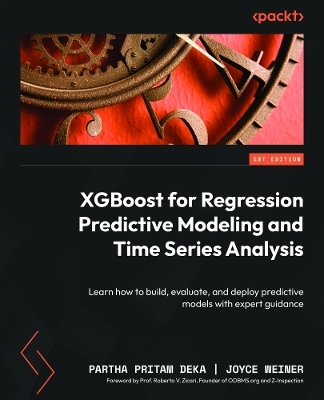
XGBoost for Regression Predictive Modeling and Time Series Analysis
Packt Publishing Limited (Verlag)
978-1-80512-305-7 (ISBN)
Key Features
Quick start guide using XGBoost to build a classifier, getting you up and running right away
Easy-to-follow deep dive explanation of the XGBoost technical paper
Application of XGBoost to time series data covering moving average, frequency, and window methods
Book DescriptionXGBoost is a popular open-source library that provides an efficient, effective, scalable and high-performance implementation of the gradient boosting algorithm. You will be able to build an intuitive and practical understanding of the XGBoost algorithm through our demystifying the complex math underneath and explanation of XGBoost’s benefits over other decision tree ensemble models, including when to use XGBoost or other prediction algorithms. This book provides a hands-on approach to implementation of the XGBoost Python API as well as the scikit-learn API that will help one to be up-and-running and productive in no time. with step-by-step explanations of essential concepts, as well as practical examples, this book begins with a brief introduction to machine learning concepts, then dives into the fundamentals of XGBoost and its benefits before exploring practical applications. You will get hands-on experience using XGBoost through practical use cases on classification, regression, and time-series data. By the end of this book, you will have an understanding of the XGBoost algorithm, have installed the XGBoost API, downloaded and prepared a practical dataset, trained the XGBoost model, make predictions, and evaluated and deployed models using the Python and scikit-learn API.What you will learn
Build a strong intuitive understanding of the XGBoost algorithm and its benefits
Gain hands-on experience with the XGBoost Python API through multiple practical use cases for classification, Regression and Time series analysis
Get experience with feature engineering, feature selection and categorical encoding
Evaluate models using various metrics
Gain hands-on experience with XGBoost model deployment
Who this book is forThis book is for data scientists, machine learning developers, and anyone with basic coding knowledge and familiarity with Python, GitHub and other Dev Ops tools, looking to build effective predictive models using XGBoost. We address the top three common problems when building predictive models: problems with available data such as missing data and non-normal data, the desire to combine numeric and text (categorical) data, how to get value out from non-numeric data to improve predictions, and how to deploy and sustain a model, how to measure and improve model fitting.
Joyce Weiner has over 25 years' experience in the semiconductor industry both in manufacturing and in product engineering. Her area of technical expertise is data science and using data to drive efficiency. She has presented technical papers at INFORMS Analytics and ASME InterPack and has been a Track chair for the ASME InterPack conference and others. She holds one US patent. Her book, “Why AI/Data Science Projects Fail: How to Avoid Project Pitfalls” was published in 2021.
Table of Contents
Introduction: Machine Learning Overview, Classification, and Regression
XGBoost Quick Start Guide with Iris data Case Study
Demystifying the XGBoost Paper
Adding on to the Quick Start: Switching out the dataset with Housing data Case Study
Classification and Regression Trees, Ensembles, and Deep Learning Models - what's best for your data?
Data cleaning, Imbalanced Data, and Other Data Problems
Feature Engineering
Encoding Techniques for Categorical Features
How to Use XGBoost for Time Series Forecasting
Model interpretability, Explainability, and Feature Importance
Metrics for Model evaluations and Comparisons
Managing feature engineering pipeline in Training and Inference
Deploying Your XGBoost Model
| Erscheinungsdatum | 04.06.2024 |
|---|---|
| Verlagsort | Birmingham |
| Sprache | englisch |
| Maße | 191 x 235 mm |
| Themenwelt | Mathematik / Informatik ► Informatik ► Theorie / Studium |
| Informatik ► Weitere Themen ► Hardware | |
| Mathematik / Informatik ► Mathematik | |
| ISBN-10 | 1-80512-305-X / 180512305X |
| ISBN-13 | 978-1-80512-305-7 / 9781805123057 |
| Zustand | Neuware |
| Informationen gemäß Produktsicherheitsverordnung (GPSR) | |
| Haben Sie eine Frage zum Produkt? |
aus dem Bereich


